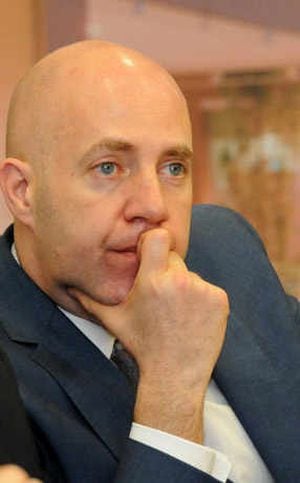Black Country business leaders unimpressed with 2017 Spring Budget
Business leaders in the Black Country were distinctly underwhelmed by Chancellor of the Exchequer Philip Hammond's last ever spring Budget.

There was a feeling that there was little for the area from the measures announced yesterday at a briefing held by the Black Country Chamber of Commerce and the Black Country Growth Hub in the Grand Station, Wolverhampton.
Chamber chief executive Corin Crane said there was more interest in hearing what the Midlands Engine strategy would mean for the Black Country.
"We are expecting some big announcements from that," said Mr Crane.
He said that it was difficult to pick out what was new money and what had been previously announced from Mr Hammond's statement and said there had been lots of 'tinkering around' on things like National Insurance for the self employed and tax, but nothing really ground breaking.
MORE: Midlands holds key to UK economy, says chancellor during Black Country visit
MORE: Philip Hammond pledges nearly £80m to drive Midlands Engine
MORE: Dudley College chief welcomes focus on training

He was disappointed that there was no suggestion of any big investment in under performing schools in the Black Country.
"What the Budget did show is that the economy looks stronger than it was. It was the Budget of a confident Chancellor of the Exchequer," added Mr Crane.
But Dr Stuart Farquhar, senior lecturer in finance at the University of Wolverhampton, said the big concern was that household debt was back to similar levels before the economic crisis in 2008 and the growth levels were below the average trend prior to the crisis.
"We can almost forget going back to a trend of growth over the next 10 years. We have got to think about how we are going to deal with a lower growth economy," he added.
Bryan Manley-Green, owner of Alchemy Transactions, Oldbury, said that more funding on major roads in the regions was needed and urged the Chancellor to work with the new Mayor of the West Midlands Combined Authority on that.
Mr Crane said that the £23 million announced from the National Pinch Point Fund to tackle congestion on the West Midlands road network was only going to be "a drop in the ocean."
The Rev Bill Mash, of the Black Country Urban Industrial Mission said he was worried that the Budget had no recognition of the rising scale of personal debt. This marks a real disconnect between the Chancellor and the lifestyle of ordinary folk.
"There are people here who would like to be able to put £10 away in a savings account let along the £10,000 to £20,000 in an ISA the Chancellor thinks will help people," he added.
Frank Cochran, of FSC Investment Services, Wolverhampton, said that the devil was going to be in the detail once the Budget white paper had been studied.
James Sage, head of corporate at FBC Manby Bowdler, Wolverhampton, welcomed investment in skills, particularly across the science, technology, engineering and maths subjects.
Manufacturing businesses need to recruit the right people with the right skills if they are to grow and compete on a global playing field.
Investment in STEM training and education and the new T-levels will see an increase in the number of school leavers entering the workplace with the vocational skills required by employers.
Rupert Hutton, tax executive director at Ernst and Young, said: "It was disappointing to hear the region's limited funding of £23m compared to the North's £90m on road infrastructure and tackling the issue of urban congestion – a continuing theme from the Chancellor in a perceived preference of the Northern Powerhouse over the Midlands Engine."
Charlotte Horobin, Interim West Midlands director for EEF, the manufacturers' organisation, said: "Current economic indicators offer the Chancellor confidence about the resilience of the UK economy, but we remain some way off from possible Brexit uncertainty.
"As such, the Chancellor is right to be pragmatic, recognising the need to avoid jam today and saving the fiscal jam tomorrow to use wisely if the economy encounters turbulence during the process of exit from the EU."





